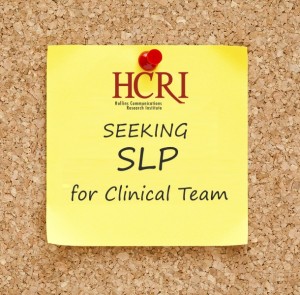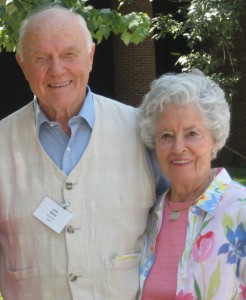December 8, 2015, Roanoke, Virginia – Hollins Communications Research Institute (HCRI ), a nonprofit center dedicated to stuttering research and innovative therapy delivery, is seeking a Speech-Language Pathologist (SLP) to join the Institute’s clinical team.
 Interested persons who meet the required qualifications listed below may apply by clicking here to send an email. Type “Clinician Applicant” in the email subject line and include a resume, cover letter, three job references and salary requirements.
Interested persons who meet the required qualifications listed below may apply by clicking here to send an email. Type “Clinician Applicant” in the email subject line and include a resume, cover letter, three job references and salary requirements.
Position:
Speech Language Pathologist (SLP) – Clinician
Job Type:
Permanent, Full-time Position
Location:
Roanoke, Virginia
[Relocation not provided]
Career Level:
Experienced SLP, Non-manager
[Stuttering specialty not required. Extensive training will be provided.]
Salary:
Commensurate with experience.
Excellent benefits package and work environment
ABOUT HCRI
Founded in 1972 by Ronald L. Webster, Ph.D., Hollins Communications Research Institute (HCRI) has grown into a world-leading center for the investigation and treatment of stuttering, which affects 66 million people globally. The nonprofit Institute is unique from other stuttering centers in that work focuses on developing scientifically based treatment methods and learning technologies, in addition to administering therapy programs.
HCRI pioneered the concept of physically based treatment for stuttering more than 40 years ago and has continued to enhance the therapy program over the years. New research findings, advanced electronics and computers have been incorporated into the behavioral treatment process to enhance the ease of learning and retaining fluent speech.
More than 6,400 persons from across the U.S. and 50 countries have participated in HCRI’s stuttering therapy program. Ninety-three percent of clients achieve fluency by the end of treatment. Follow-up studies show 70 to 75% retain fluency for the long term. These stuttering therapy success rates are among the highest in the industry. To learn more, visit www.stuttering.org.
POSITION SUMMARY
As a member of the HCRI team in Roanoke, Virginia, the full-time SLP clinician will have a direct impact on the lives of people who stutter. Through the delivery of HCRI’s proprietary stuttering therapy program, he/she will help clients acquire skills to speak fluently so they may experience the joy and opportunity that come with fluency.
The clinician will participate in a comprehensive, 500-hour clinician training program once hired to ensure confident, precise and measured delivery of HCRI stuttering therapy.
Clinician responsibilities encompass the following:
Therapy Delivery:
The clinician provides therapy administration to a diverse group of adult men and women, as well as some youth ages 11 and older, who have a life-long stuttering condition. HCRI’s behavioral stuttering treatment is performed in a group setting with ten clients at a time for 12 consecutive days. There are up to 13 therapy programs annually, along with five or more refresher training courses.
Through the administration of HCRI’s standardized stuttering treatment, the clinician will help clients learn how to replace faulty speech muscle movements that cause stuttering with new behaviors that enable fluency.
He/she will work collaboratively with other HCRI clinicians and staff to serve clients, as well as use a variety of technological tools to ensure precision, quality controlled therapy delivery.
Post-Therapy Support:
The clinician will provide post-therapy phone follow-up with clients to help ensure long-term fluency outcomes. For former clients who need fluency help, the clinician will conduct five-day refresher training classes during the year. Responsibilities also include helping to organize and lead sessions for HCRI’s annual client reunion, as well as conduct other fluency workshops as needed.
Other Responsibilities:
The clinician will provide input to the HCRI team to help advance client services and grow the Institute’s therapy program. He/she will also be required to attend staff meetings, document client services, and marshal other projects as needed.
REQUIREMENTS
- Master’s degree – Speech Language Pathologist
- Behavioral therapy experience
- Highly motivated to consistently achieve standards of excellence
- Positive, high-energy attitude and work style
- Passionate about helping make a difference in people’s lives
- Willing to work some weekends and occasional evenings
- Proven ability to work collaboratively in team environment to achieve successful client outcomes
TO APPLY
Inquiries are encouraged from qualified individuals who want to be part of HCRI’s team of compassionate, hardworking employees. To apply, please send an email with the following to admin@stuttering.org and type “Clinician Applicant” in the subject line. (No phone calls please.)
- Resume
- Cover letter explaining behavioral therapy experience and reason(s) for interest in HCRI’s clinician position
- Salary requirements
- Names and contact information for three references
As an EOE employer, HCRI welcomes all qualified applicants regardless of race, age, gender, religion, education, nationality, ethnicity, family circumstance, marital status, veteran status, sexual orientation, gender identity and expression, and physical or mental ability.
HCRI is a drug and alcohol-free workplace


.jpg)


 azonSmile is a simple and automatic way for you to support HCRI every time you shop, at no cost to you.
azonSmile is a simple and automatic way for you to support HCRI every time you shop, at no cost to you.